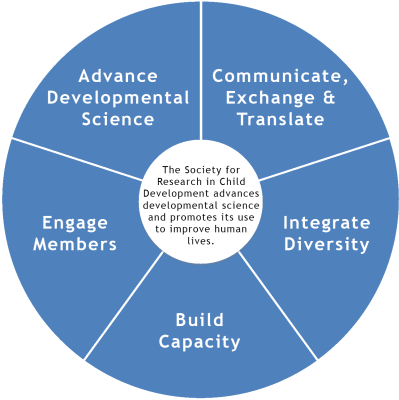Strategic Vision
SRCD’s mission is rooted in an understanding of child development as an integrated part of lifelong development that takes place in complex and interrelated contexts. It is based on a belief that in order to create reliable, valid, and useful knowledge, developmental science must explore a diverse array of biological, cognitive, psychological, social, and cultural dimensions of development through rigorous scientific inquiry that uses multiple perspectives, methods, and levels of analysis. This task requires approaches that represent individual disciplinary traditions as well those that integrate multiple disciplines across a broad range of biological, behavioral, and social sciences. This task also requires diversity in all its forms—among the children, families, and communities who are studied; among the scientists who conduct this work; and among the students who are preparing to be future teachers, practitioners, and researchers. Although no single study can incorporate the full range and scope of these disciplinary and diversity goals, SRCD takes the position that a full, integrative field of developmental science is needed to achieve a comprehensive understanding of human development and to foster the effective application of that understanding to improve human well-being.
Strategic Goals
In 2015, SRCD’s Governing Council released its 10-year Strategic Plan, which identified five overarching goals intended to fulfill the mission of SRCD. Each goal is being developed further into specific strategies and action plans that include guidelines for ongoing assessment and revision.
Goal 1: Advance Developmental Science
SRCD will advance cutting-edge and integrative developmental science research.
Researchers from across the social and biological sciences, and from regions around the world, have been addressing questions of great importance related to human development. The resulting disciplinary and methodological diversity has already led to great advances in scientific knowledge. SRCD will continue to encourage and support researchers as they design, adopt, and adapt to new technologies and methods, and as they broaden their focus to include more diverse contexts and methods. Moreover, SRCD will expand efforts to encourage and support researchers’ efforts to collaborate, integrate, and communicate research across disciplines, cultures, and national borders to foster a more fully integrative developmental science. SRCD will enhance its already key role in nurturing scholars at all career stages, and in fostering connectivity, collaboration, and integration across the domain of developmental science.
Goal 2: Communicate, Exchange and Translate
SRCD will be a respected source of scientific knowledge about human development and about the application of this knowledge to policies and practices for improving human well-being.
SRCD understands the potential that developmental science holds for improving human lives, and the need for rigorous developmental research to inform policy and practice. However, there are challenges to connecting scientific discoveries with applications, including short timelines for providing critical policy recommendations, the difficulty of translating findings into language that speaks to multiple and diverse audiences, and insufficient public understanding of the value of developmental science. Building on its past successes in translating research into meaningful and useful recommendations for policymakers and practitioners, and in concert with allied organizations in the United States and around the world, SRCD will enhance its ability first, to communicate developmental science research to audiences that address policy and practice and second, to facilitate communication channels from policy makers and practitioners to inform research initiatives.
Goal 3: Integrate Diversity
SRCD will integrate racial, cultural, economic, national and contextual diversity in all spheres of developmental science.
Human development is inextricably linked to, and shaped by, the diversity of human biology, society, and culture. Understanding and investigating this diversity is an essential requirement for building an accurate and more complete knowledge base in developmental science. SRCD recognizes that integrative developmental science as a whole must reflect diversity in the individuals and communities it studies, in the policies and practices it addresses, and in the scientific workforce it engages and trains. Although no single study or program can address all aspects of diversity, the success and relevance of developmental science as a whole rests on attention to and support of diversity in all its forms.
Goal 4: Build Capacity
SRCD will build capacity, infrastructure, resources and human capital for developmental science and its application, both in the US and internationally.
To advance developmental science through SRCD, the Society will identify ways to strengthen its financial, infrastructural, and human capital foundations. This goal entails improving the pipeline for new generations of scientists, increasing funding sources for developmental science, building technological infrastructure, and strengthening links among international societies and other institutions. This goal cannot be met by a single organization or country alone; rather, it requires strategic national and international collaboration.
Goal 5: Engage Members
SRCD will seek to fully engage members at all career levels and across disciplinary and methodological traditions so that SRCD is experienced as an essential organization for all developmental scientists.
As a membership organization and academic home for a wide array of scholars, SRCD seeks to enhance the value and advantages of membership for current members in ways that support their work within a changing environment and across professional contexts. While serving current members, SRCD will also strive to broaden access and attract a more diverse membership that can represent and build an integrative developmental science through a range of methods, disciplines, and national and cultural perspectives.

Governance & Corporate Documents
- Strategic Planning Process
- SRCD Governance and Climate Recommendations
- SRCD Bylaws
- SRCD Policy on Indirect Cost for Grants & Awards